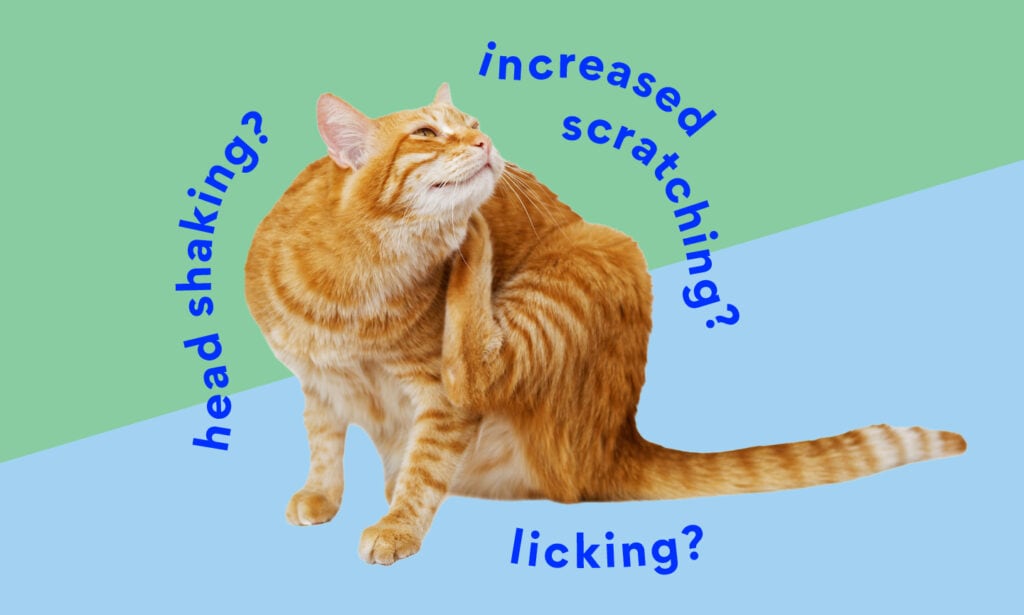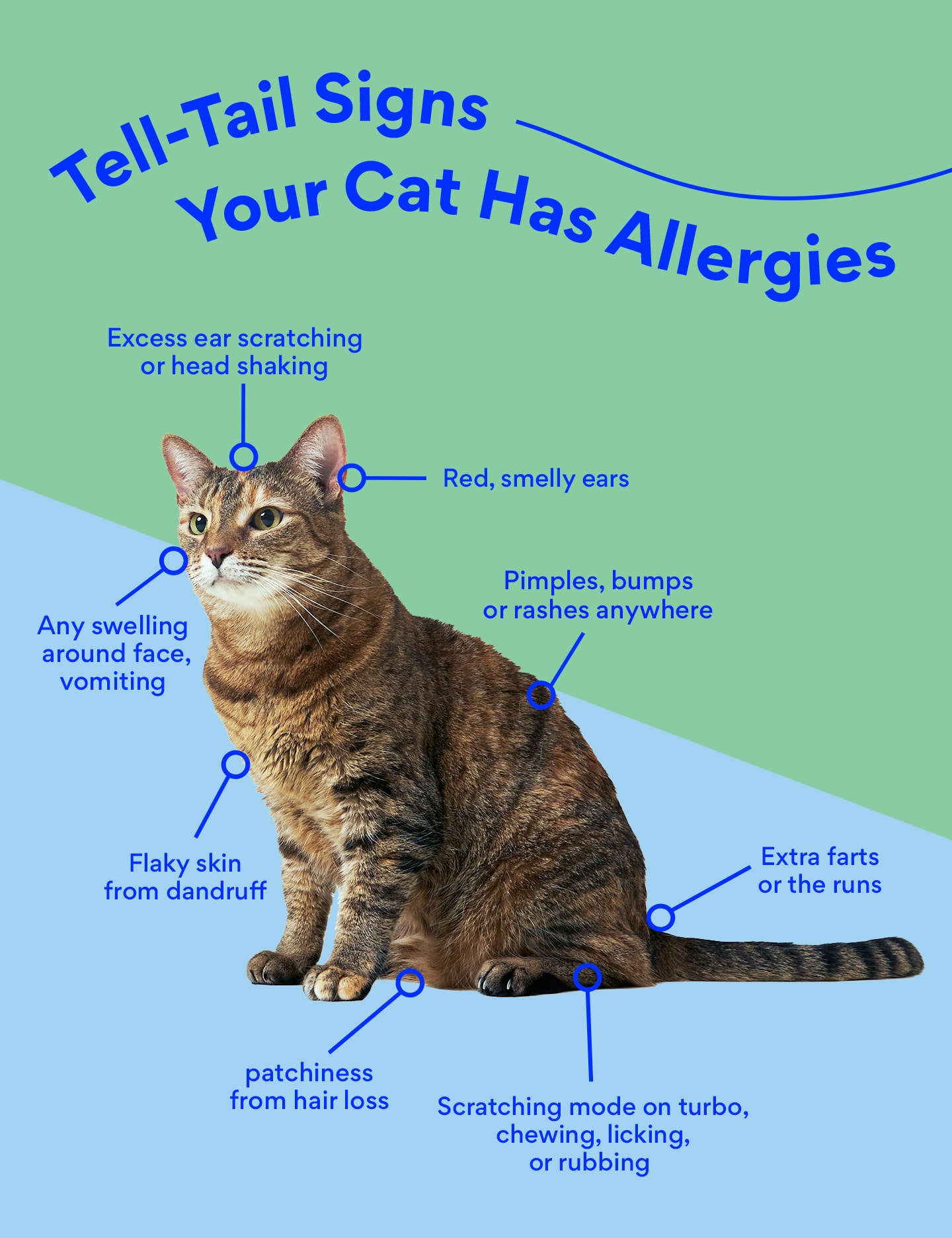Itchy skin, hair loss, skin and ear infections: Allergies in cats can manifest in many ways—none of which are particularly comfortable for your furry friend. Luckily, though, there are several options for allergy relief in cats.
You should always talk to your veterinarian and get a diagnosis of allergies before treating an allergic cat. This is because many other skin conditions such as bacterial skin infections or mites have similar signs to skin allergies but require different treatments. Always work with your veterinarian if you have a cat with allergy symptoms to get to the bottom of the problem and solve it, if possible.
In This Guide:
Diagnosing Cat Allergies
While the true prevalence of allergies in cats is unknown, it’s believed to affect anywhere from 10 to 15 percent of cats. And one of the most common cat allergies? Flea allergy dermatitis, which is among one of three main skin allergies in cats:
1 Flea Allergy Dermatitis
Flea allergy dermatitis (FAD) is caused by an allergic reaction to flea saliva.
The classic signs of FAD in cats include:
- Itching
- Scratching around the head and neck
- Miliary dermatitis along the back
- Hair loss
- Scabs around the base of the tail or around the head and neck
You may or may not see fleas.
FAD can be so intense that it takes just the bite of one passing flea to make a cat miserable and pull their hair out!
2 Environmental Allergies
Environmental allergies such as seasonal allergies to pollens, dust mites, or mold are called atopy.
Signs of atopy include:
- Itchiness around head and neck—but cats may be itchy elsewhere. Itching may or may not be seasonal, depending on the allergen.
- Recurrent ear infections and miliary dermatitis
- Secondary skin infections with yeast and bacteria
- Eosinophilic granuloma complex lesions
Usually first seen in cats ages 6 months to 2 years of age, atopy may be linked to asthma or chronic bronchitis in some allergic cats.
3 Food Allergies
More accurately known as adverse food reactions, this is when a cat reacts to an ingredient in the food, usually a source of protein. Affected cats are usually fed the offending ingredient for two years before developing signs. The most common allergens in cats are protein in nature and include chicken, beef, pork, egg, soy and dairy.
The second most-common itchy skin disease in cats, with Siamese cats predisposed to this condition, food allergies usually have both skin and GI signs and are year-round or occur after eating an offending food.
Cats who have a food allergy often have concurrent flea allergy dermatitis and/or atopy as well.
Signs of food allergies in cats include:
- Non-seasonal itching and scratching the head, neck, or in some cats, elsewhere on the body
- Hair loss
- Red skin
- Miliary dermatitis
- Eosinophilic granuloma complex
- Scabs
- GI signs such as vomiting, diarrhea, and gas
Treating Cat Allergies
Treating Seasonal Allergies in Cats

OTC Options to Help Treat Your Pet's Allergies
If your cat has been diagnosed with seasonal allergies, there are several over-the-counter allergy meds for cats and cat allergy supplements options you can try.
- Oral antihistamines
- Topically applied wipes and mousses
- Omega-3 fatty acids
- Probiotics
Antihistamines
Antihistamines block histamine, a substance your body produces in reaction to allergens, and can help treat allergy symptoms. Antihistamines in cats can cause sleepiness, like in humans, but can also cause some cats to become hyper, so it is not safe for all kitties. Talk to your veterinarian before giving your cat any medication.
Some common antihistamines your vet may recommend include diphenhydramine (Benadryl®) and chlorpheniramine.
Anti-allergy Wipes and Mousses
Topical therapy such as a wipe, mousse or conditioner can be a good way to help calm irritated skin. However, our kitty friends do not tend to love water and baths, so we tend to reach more for the waterless options.
- You can wipe your cat with a pet wipe, like Vetnique® Labs Dermabliss™ Medicated Hydrocortisone 3-In-1 Allergy Wipes, after they go outside and roll in the grass. If the skin is really irritated, an antiseptic, antifungal wipe (like Duoxo™) may provide even more support.
- Or you can try a calming mousse (like Dermoscent®) on your feline friend’s itchy skin.
Omega-3 Fatty Acids (Fish Oil)
Some cats with seasonal allergies respond well to fish oil supplementation. Fish oil supplements, like Vibeful™ by Chewy Wild Alaskan Salmon Oil for Cats & Dogs, may offer natural allergy relief for cats by helping reduce inflammation associated with skin allergies. They may also help skin cells maintain a strong barrier against allergens. You can give a cat too much fish oil, however, and fish oil is not indicated for all cats, so consult with your veterinarian on the use of fish oil and the appropriate dosage before giving fish oil to your cat.
The omega-3 fatty acids that help cats with allergies are EPA and DHA. While cats can convert GLA and ALA (the fatty acids found in evening primrose oil and flaxseed), they do so poorly and benefit the most from fatty acid supplementation from fish or krill oil.
Probiotics
Some cats with seasonal allergies may benefit from taking a probiotic. Allergies are due to inflammation and an abnormally hyper-reactive immune system. The largest immune system in the body is called the GALT, and it is in the gut. Unhealthy or inflamed intestines with abnormal gut bacteria can contribute to allergies, which is why supplementing an allergic cat with probiotics may help reduce inflammation in the body and help rebalance their gut immune system.
Do not supplement cats with human probiotics, as human gut bacteria is different from feline. If your vet recommends a probiotic, use a feline-specific product, like Vibeful™ by Chewy Probiotic Gastrointestinal Support Powder Digestive Supplement.
Prescription Medicine
Sometimes, supplements and OTC products for cat allergies are not enough, and cat owners need prescription medication from the veterinarian to stop the itch. Often, cats benefit from a combination of both. Prescription medicine includes:
- Prescription topical treatments
- Prescription oral treatments
- Allergy shots
Always make sure you tell the vet what supplements, products and medications you are currently giving your cat, as they can potentially interact with prescription meds.
Prescription Topical Treatments
For itchy, infected skin, Animax® Ointment—a prescription topical treatment that combines a corticosteroid, an antifungal and an antibiotic—may help. Other topical steroid sprays or lotions may also be prescribed.
Prescription Oral Treatments
Glucocorticoids
Glucocorticoids, or steroids, typically relieve the itch of atopic dermatitis quickly and effectively but may lose efficacy over time. They come in many forms, including oral tablets and liquids as well as injections, and may include prednisone, prednisolone, dexamethasone, depomedrol and more. These medications can have undesirable side effects, including increased appetite, increased drinking and urinating, and elevated liver enzymes. When using glucocorticoids for allergies, your vet will likely try to wean your pet to the lowest possible dose that controls their clinical signs.
Atopica™
Atopica™ is the brand name for cyclosporine, a medicine for cats with allergies. Atopica™ inhibits inflammation without the use of steroids to provide relief.
- Atopica™ is an FDA-approved liquid prescription used for itching and inflammation related to feline allergic dermatitis.
- Atopica™ can be squirted directly into the cat’s mouth after feeding.
- Most veterinarians will require annual bloodwork and an exam to fill this prescription.
- Atopica™ takes a minimum of four to six weeks to provide relief, and other medications may be prescribed to your cat in the interim to control allergy symptoms.
Allergy Shots
If your cat cannot tolerate oral medications or you do not want to give oral medications over a long period of time, you may want to talk to your veterinarian about giving allergy injections, commonly known as allergy shots, for cats or immunotherapy.
Allergy shots typically require owners to take their pet to a veterinary dermatologist for allergy testing. The dermatologist will perform a skin prick test, like in human allergy testing, to determine what your cat is allergic to.
Once the test is done, an allergy serum is created. This allergy serum is usually administered via a series of injections and is intended to desensitize your cat over time to the allergens that cause them grief. Improvement in symptoms can take six months to one year, and other therapies are used to control symptoms in the meantime. Allergy shots are the only way to truly reduce the instances of allergy symptoms. All other cat allergy medicine is aimed at controlling symptoms.
Treating Flea Allergy Dermatitis in Cats

OTC Medications
For cats with FAD, over-the-counter medications include the following:
- Topically applied wipes and shampoos
- Omega-3 fatty acids, which can help with promoting skin health but not with treating FAD
Prescription Medications
As for prescription medications, they include:
- Apoquel®
- Prednisone
- Prednisolone
- Triamcinolone
- Betamethasone
Treating Cat Food Allergies

Food Elimination Trial
Food allergies can only be diagnosed by a food elimination trial.
The basic gist of a food trial is this:
- You work with your veterinarian to choose a prescription hypoallergenic diet for your cat (more on that below).
- Then, after you slowly transition your cat to the new food over three to five days, you will feed only that food to your cat for eight to 10 weeks. That means that nothing else other than the hypoallergenic food will go in your cat’s mouth—no other treats, table food, flavored medications, or chews, etc. Your cat must consume only that food.
The reason you must only feed the hypoallergenic diet for eight to 10 weeks is to diagnose a food allergy. Since it takes about 20 days for feline epidermis (skin) to turn over and at least six weeks for previous allergens to clear out, diet trials must last eight to 10 weeks.
If all the itching goes away on the new diet, then it is likely that your cat has a food allergy. If that is the case, then you have two options:
- Either stay on the hypoallergenic diet, or
- slowly start to reintroduce foods into your cat’s diet and see if the symptoms return.
Most pet parents understandably don’t want the itching to return, so they elect to keep feeding their cat the hypoallergenic diet.
Hypoallergenic Foods
If your veterinarian has recommended a diet trial, it is important to follow their food recommendations precisely. Over-the-counter foods are not considered good hypoallergenic choices for food trials because they are often manufactured on machines that make other foods. Hypoallergenic foods generally are created on dedicated machines that are meticulously cleaned to prevent cross-contamination with allergens (this is also one reason why these diets cost more).
There are two main types of food to choose for diet trials: hydrolyzed foods, which are foods that are manufactured to remove allergens, or novel protein foods, where you feed your cat a protein and carbohydrate that he has never eaten before.
Popular cat food for cats with allergies that are used by veterinarians for diet trials could include the below. Note that these foods are veterinary diet foods and therefore require an authorization from your veterinarian.
Treating the Environment for Cat Allergies

If you have a cat with allergies, then you also need to think about treating the environment your cat lives in, especially if your cat suffers from flea allergies or atopy. This includes:
- Flea control
- Reduce exposure to allergens
- Combination of therapies
Flea Control
If your cat has a flea allergy, then the bite of just one flea can drive her crazy. Use flea control consistently on all pets in the household consistently throughout the year to keep flea allergies under control. (Be sure you use a flea and tick treatment formulated specifically for each type of pet. In other words, don’t give your cat a flea and tick treatment formulated for dogs, and vice versa.)
Watch our Chewtorial on how to get rid of cat fleas.
Reduce Exposure to Allergens
If your cat has atopy, then you need to reduce exposure to allergens. Some ways to potentially reduce exposure to allergens could be to use a HEPA filter in your furnace, plug in some air purifiers, cover bedding with an allergen barrier, and wash pet bedding once a week during allergy season with a gentle, hypoallergenic laundry detergent.
Combination of Therapies
So, what can you give your cat for allergies? Every cat is unique, and causes and severity can vary, so the answer might be more complicated than you thought. Controlling allergies takes some trial and error, and usually requires a combination of therapies. Working with your veterinarian, you can discover what to give your cat for allergies—and stop the itching for good.
Cat Allergies FAQs

Q: What causes cat allergies?
A: In cats, allergies can be caused by pollen, dust, dust mites, mold, dander, and other allergens—just like in humans. Cats can also be allergic to flea saliva when they are bitten by fleas, or develop allergies to ingredients in their food, resulting in itchy skin and digestion abnormalities.
Q: Is there an allergy pill for cats?
A: There are several oral medications that have been used for allergies in cats, including diphenhydramine, hydroxyzine, chlorpheniramine, clemastine, cyclosporine and prednisolone. Talk with your veterinarian about which option is best for your cat and the correct dosage to administer.
Q: What are the side effects of cat allergy medication?
A: Side effects of antihistamines include excessive tiredness, hyperactivity, and vomiting, diarrhea and seizures in sensitive animals. Side effects of cyclosporine include nausea, vomiting, diarrhea and gingival hyperplasia. Side effects of steroids include increased drinking and urinating, as well as increased appetite.
Q: How do I get rid of allergens in a cat's litter box?
A: The best way to get rid of allergens in a cat’s litter box is to use a low dust litter. Avoid litters that contain granulated (bentonite) clay. Choose low-dust biodegradable litter or silica litter.
Scoop the litter once or twice daily and change the litter every two to three days. When you change the litter, clean the box with warm, soapy water, rinse well, and let air dry. It is best to have two boxes in rotation. Place the litterbox in a well-ventilated area away from the central air intake vent or furnace (both create dust), and avoid using a hood or covered box.
Q: What is the best antihistamine for cats?
A: Diphenhydramine, hydroxyzine, chlorpheniramine and clemastine have all been used in cats. Talk with your veterinarian about which option is best for your cat and the correct dosage to administer. Antihistamines work best if given before itching starts.
Q: What kind of Benadryl® is safe for cats? How much Benadryl® can I give my cat?
A: Most cats can tolerate diphenhydramine, which is the active ingredient in Benadryl®. Always check with your vet before giving your cat Benadryl® and ask your vet what dose is appropriate for your cat.
There are no “stupid” questions when it comes to your pet’s health. If you suspect your pet is sick, contact your veterinarian immediately. For health-related questions, always consult your veterinarian when possible as they can make the best recommendations for your pet. Next, learn how to put together an emergency kit for your pet.
This content was medically reviewed by Chewy vets.
More About Pet Allergies:
Share:



























